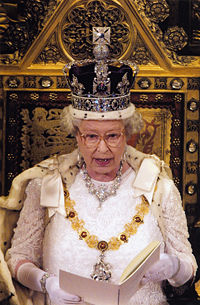Parliament of the United Kingdom: Difference between revisions
imported>Nick Gardner No edit summary |
imported>Nick Gardner |
||
| Line 30: | Line 30: | ||
==The Palace of Westminster== | ==The Palace of Westminster== | ||
The parliamentary chambers and committee rooms are housed in the [http://www.woodlands-junior.kent.sch.uk/customs/questions/london/attractions/westminster.htm Palace of Westminster] | |||
<ref>[http://www.parliament.uk/about/living-heritage/building/palace/ ''The Palace of Westminster'', www.parliament.gov.uk]</ref> | |||
==Parliamentary tradition and ceremonial== | ==Parliamentary tradition and ceremonial== | ||
Revision as of 11:06, 1 March 2012

The monarch visits Parliament annually in a ceremony to begin parliamentary proceedings. During this State Opening of Parliament, the Queen's Speech sets out her government's intentions for the coming year.
The Parliament of the United Kingdom examines and challenges the work of the government; debates and passes laws, and enables the government to raise taxes. The business of Parliament takes place in two Houses: the House of Commons and the House of Lords. Their work is similar, except that the House of Commons alone is responsible for making decisions on financial Bills. The members of the House of Commons are elected representatives of geographically determined parliamentary constituences, whereas the those of the House of Lords are mostly appointed, having been chosen for their experience and expertise. The functions of the Crown (monarchy) in Parliament are essentially ceremonial [1]
History
(additional links are available on the timelines subpage)
The United Kingdom Parliament is the product of eight hundred years of evolution
[2] that converted what was once a meeting of monarch's advisers into what is now a sovereign legislature. The transfer of sovereignty from the monarch began in the 13th century with the agreement that is recorded in the Magna Carta, and was largely completed in the 17th century by the outcome of the Glorious Revolution, as codified in the Bill of Rights. Its development as a representative body started in the early 14th century with the regular appointment of representatives of the counties (knights of the shire) and of the towns (burgesses). After 1341 they sat together in one chamber, became known as the House of Commons, and deliberated separately from the King and his nobles.
[3]
A restricted right to vote in elections of Members of Parliament was establised in the 15th century by the Franchise Act, 1429, which conferred that right upon freeholders of land worth more than 40 shillings, and was extended in stages until universal adult suffrage was established by the Representation of the People acts of 1918 and 1928. The relative influence of the House of Lords was simultaneously reduced, and its power to overrule the House of Commons was removed in 1911[4].
The Houses of Parliament
House of Commons
The House of Commons shares with the House of Lords the functions of scrutinising government activity and approving legislative proposals, but it has legislative priority in the sense that it cannot be overruled by the House of Lords. Its work is carried out by elected Members of Parliament with the support of an administrative staff. Members of Parliament serve in a range of rôles, including "ministers" who are the political managers of government departments, and "shadow ministers" who are their opposition counterparts; the "Leader of the House" and the "whips", who together manage the business of the House; and "backbenchers" to whom none of those duties have been assigned. Its chief officer is "the Speaker", who chairs its debates, enforces its rules, acts as its spokesman, and takes charge of its administrative staff.
House of Lords
As Parliament's second chamber, the House of Lords[5] plays an important part in the scrutiny of legislation. All House of Commons legislation must be sent to it for consideration before becoming law. Its appointed members are often able to apply expertise or experience to such legislation, but their power to deal with it is limited by a combination of law and convention. They cannot amend budgetary proposals, they cannot hold up other legislation for much more than a year; and there is a convention under which they do not oppose proposals that fulfill promises made in the governing party's election manifesto [6].
The Crown
The phrase "Crown in Parliament" is a pedantic statement of the full constitutional makeup of the United Kingdom's legislature, but the Sovereign's legislative rôle arises only from the constitutional requirement that the that Bills passed by Parliament become law only after they have received royal assent. The personal discretionary powers of the Sovereign which are part of the royal prerogative include the rights to advise, encourage and warn Ministers in private; to appoint the Prime Minister and other Ministers; as well as to assent to legislation. The Sovereign may, in a grave constitutional crisis, act without or against ministerial advice. In ordinary circumstances, however the Sovereign, accepts and gives way to Ministerial advice. The executive powers of the royal prerogative are nowadays exercised by Ministers, and can be exercised without the prior consent of Parliament. They include diplomatic action and the declaration of war.
Legislative procedures
Legislative proposals, termed Bills, are dealt with in a succession of parliamentary stages, termed readings; including examinations in legislative committees, and full-scale debates in the parliamentary chambers. The legislative process concludes with the entirely formal stage of Royal Assent, and the end product is termed an Act of Parliament. The underlying procedures and conventions are such that the final outcome of the prcesses of scrutinising, debating and amending government proposals is usually their passage into law.
Scrutiny
The Palace of Westminster
The parliamentary chambers and committee rooms are housed in the Palace of Westminster
Parliamentary tradition and ceremonial
References
- ↑ Parliament and Crown, www.parliament.c.uk
- ↑ The Evolution of Parliament, www.parliament.uk
- ↑ The Rise of the Commons, www.parliament.uk
- ↑ Except in respect of a House of Commons motion to extend its own life
- ↑ House of Lords, www.parliament.gov.uk
- ↑ The Work of the House of Lords, House of Lords, 2009.
- ↑ The Palace of Westminster, www.parliament.gov.uk